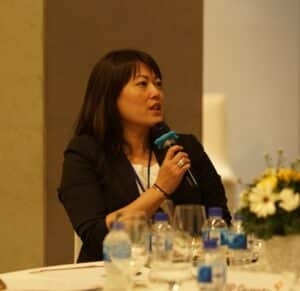Better Work and Vietnamese garment industry partners gather to discuss sustainability in an era of uncertainty
Ho Chi Minh City, 28th September 2018 – Expanding public-private partnerships to improve industry sustainability was among the key topics discussed at a meeting of brands, government and other garment industry partners. Participants at Better Work Vietnam’s 9th annual Business Forum agreed that joint action to tackle critical industry challenges was all the more pressing given the uncertain external context, not least the escalating trade tensions in the global supply chain.
In a keynote address to the forum, distinguished economist Pham Chi Lan reflected on this and other global megatrends, including automation and digitization, which are already having profound impacts on production and consumption patterns around the world.
Coupled with an ageing population and productivity and skills gaps at home, Lan argued that deeper collaboration between the private and public sectors can serve as a powerful tool to help drive the transition to a more resilient, dynamic and socially inclusive economy.
It’s a message supported by Nguyen Hong Ha, Programme Manager of Better Work Vietnam: “Increasingly today, business success is being judged not just on economic performance alone, but by its ability to meet the triple demands of people, planet and profit,” she said. “To meet this challenge, all stakeholders need to be on the same page, so that we have a legal environment that supports both workers and business, and a business culture that supports sustainability.”
The meeting, which convened leading figures from the apparel and footwear industry, including responsible sourcing teams and garment manufacturers active in Vietnam, shared strategic visions and identified collaborative opportunities to remodel the supply chain and place social responsibility at the heart of business behavior.
Representatives from Nike and Esquel Garments in Vietnam were on hand to share their corporate visions for sustainability in the coming years; whilst Better Work also shared insights from recent new initiatives under its new five-year strategy, aimed at strengthening public-private partnerships and boosting national ownership of the Better Work model. The Better Work Academy and Building Bridges programme have been building the capacity of brand representatives and public officials respectively, to replicate Better Work tools and approaches across the industry.
In a first for this event, participants were also joined this year by representatives from the Government and its social partners. Addressing the audience on effective public-private engagement, MOLISA’s Chief Labour Inspector, Nguyen Tien Tung, praised Better Work for its pioneering early work on firm level social dialogue, which is now embedded in the labour law, as well as its more recent collaboration (with the Labour Inspectorate) to boost inspector skills and jointly manage persistently non-compliant factories.
Calling for greater joint investments in workforce training to address the productivity challenge, outgoing Vice President of the Vietnam General Confederation of Labour (VGCL), Mai Duc Chinh also reiterated the importance of collective bargaining as a means to give workers a better deal at work. This is one of several areas which will receive enhanced focus in the upcoming labour law revision, thus creating a need for further assistance to firms to help them adapt and comply in the future. This will be a key priority for the Vietnam Chamber of Commerce and Industry in the coming years, according to its Deputy Secretary General, Tran Thi Lan Anh, who also spoke at the event.

Wrapping up the forum, Hong Ha drew encouragement from the emerging consensus among stakeholders. “It’s great to see manufacturers in Vietnam, including locally owned firms, working with VCCI and others to find ways to upgrade and improve their performance on responsible supply chains,” she said. Ha also reiterated Better Work’s commitment to providing a bridge for ongoing dialogue and collaboration over critical industry concerns such as labour law reform and workforce skills development.
The importance of the programme’s convening role was also echoed by brand representatives. Sean Jung, Regional Director for Global Responsibility at Gap Inc, noted that by bringing industry partners together, Better Work serves as a trusted partner that can elevate and amplify impact beyond what’s possible by working alone.
“The integration of the social partners was really helpful,” added Sandra Cho, Regional Sustainability Director for Nike. “That’s where I see a lot of the benefits of Better Work –the ability to bring these partners together”.